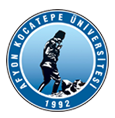| After completing the program, our students will be able to; | |
| P1 | evaluate information by understanding the nature of it and to use the methods of generating scientific knowledge. |
| P2 | use the contemporary language teaching methods and approaches by making the most appropriate pedagogical decisions for the characteristics of students (students’ needs, ages, intelligence types, learning styles, and socioeconomic levels). |
| P3 | critically analyze linguistic, literary, cultural and historical issues in the processes of selecting, developing and evaluating course content. |
| P4 | establish interdisciplinary connections and adopt the perspective of a critical researcher, based on knowledge in educational sciences, linguistics, literature, psychology and other fields. |
| P5 | identify specific language-related problems that language learners of different proficiency levels may encounter and offer solutions to these problems. |
| P6 | conduct educational research and apply research methods for language or language teaching, individually or in effective collaboration with other teachers, based on their knowledge of other education systems and their differences. |
| P7 | adapt to different local contexts by providing instruction sensitive to individual, cultural (multicultural) and psychosocial diversity in learning environments. |
| P8 | make use of all primary and secondary language skills in English while communicating effectively in daily and professional life. |
| P9 | understand, use, translate and convey discourses of a wide variety of languages by taking the contextual factors into consideration. |
| P10 | make use of language learning experiences (other than in English) to raise awareness about language learning processes. |
| P11 | engage in lifelong learning and continuing professional development processes necessary for personal and professional development, using reflective thinking and self-assessment. |
| P12 | use relevant instructional technologies in teaching processes based on information literacy and digital literacy. |
| P13 | facilitate creativity, understanding, collaboration and equity in the classroom employing effective classroom management strategies to create a positive classroom environment. |
| P14 | develop a critical, sociolinguistic and multicultural perspective on language and language-related issues arising from the global use of English. |
| P15 | act in accordance with scientific and professional ethical values in the processes of research, teaching and business obligations, by being aware of democracy and human rights. |
| P16 | promote positive attitudes in students towards language learning based on the belief that every student can learn a language effectively. |
| P17 | set an example for students and society in all aspects by considering themselves as a teacher. |
Bologna / TYYÇ Seviye 6 ile Uyumlu Program Öğrenme Çıktıları (PÖÇ’ler)
| Kategori | Tanımlayıcı (Seviye 6) | Program Öğrenme Çıktıları (PÇ’ler) |
|---|---|---|
| Bilgi | Bir alanda ileri düzeyde kuramsal ve olgusal bilgiye sahiptir; kavram, ilke ve ilişkileri anlar. | P1. Bilginin doğasını anlayarak bilgiyi değerlendirir ve bilimsel bilgi üretme yöntemlerini kullanır.
P3. Ders içeriği seçme, geliştirme ve değerlendirme süreçlerinde dilbilimsel, kültürel, tarihsel ve edebî konuları eleştirel olarak analiz eder. P4. Eğitim bilimleri, dilbilim, edebiyat, psikoloji ve diğer alanlara dayanan disiplinler arası bağlantılar kurar. P14. İngilizcenin küresel kullanımından kaynaklanan dilsel konulara ilişkin eleştirel, sosyodilbilimsel ve çok kültürlü bir bakış geliştirir. |
| Beceriler | Alan bilgisi ve becerilerini kullanarak karmaşık sorunları belirler, analiz eder ve çözer.Araştırma yöntemlerini uygular, verileri yorumlar ve çözüm üretir. | P2. Öğrenci özelliklerine uygun pedagojik kararlar vererek çağdaş dil öğretim yöntemlerini kullanır.
P5. Farklı yeterlik düzeylerindeki dil öğrenenlerinin karşılaşabileceği sorunları belirler ve çözüm önerir. P6. Farklı araştırma yöntemlerini kullanarak bireysel ya da işbirliği içinde eğitim araştırmaları yürütür. P12. Bilgi ve dijital okuryazarlığa dayalı öğretim teknolojilerini kullanır. P13. Pozitif bir sınıf ortamı yaratmak için etkili sınıf yönetimi stratejileri uygular. |
| Yetkinlik – Bağımsız Çalışabilme ve Sorumluluk Alabilme | Bağımsız çalışır, ekip içinde görev alır, sorumluluk üstlenir, strateji geliştirir ve öngörülemeyen durumları çözer. | P7. Bireysel, kültürel (çok kültürlü) ve psikososyal çeşitliliğe duyarlı öğretim tasarlar ve uyarlar.
P8. Mesleki bağlamlarda tüm temel ve ileri İngilizce dil becerilerini etkili biçimde kullanır. P15. Araştırma, öğretim ve mesleki görevlerde bilimsel ve mesleki etik değerlere, demokrasi ve insan haklarına uygun davranır. P17. Öğrencilere ve topluma her yönüyle örnek olacak bir öğretmen profili sergiler. |
| Yetkinlik – Öğrenme Yetkinliği | Bilgi ve becerilerini eleştirel değerlendirir; öğrenmesini izler ve geliştirmeden sorumludur. | P10. İngilizce dışındaki dil öğrenme deneyimlerini dil öğrenme süreçlerine yönelik farkındalık geliştirmede kullanır.
P11. Yansıtıcı düşünme ve öz değerlendirme yoluyla kişisel ve mesleki gelişimi için sürekli öğrenme süreçlerine katılır. P16. Her öğrencinin dil öğrenebileceği inancıyla olumlu tutumları teşvik eder. |
| Yetkinlik – İletişim ve Sosyal Yetkinlik | Alanla ilgili görüşlerini yazılı ve sözlü olarak etkili biçimde ifade eder.Sosyal ve mesleki bağlamlarda sorumlulukla iletişim kurar. | P8. Farklı bağlamlarda etkili iletişim kurmak için İngilizceyi akıcı ve doğru biçimde kullanır.
P9. Bağlamsal unsurları dikkate alarak farklı söylemleri anlar, çeviri yapar ve aktarır. P7. Çok kültürlü ve sosyal açıdan farklı öğrenme ortamlarına uyum sağlayan öğretim uygular. |
| Yetkinlik – Alana Özgü / Mesleki Yetkinlik | Veri toplama, yorumlama ve uygulama süreçlerinde etik, kültürel, bilimsel ve toplumsal değerlere uygun davranır. | P4. Eğitim, dilbilim ve psikoloji alanlarında eleştirel araştırmacı kimliği sergiler.
P12. Teknoloji destekli öğretim süreçlerini etik şekilde uygular. P15. Öğretim, araştırma ve kurumsal sorumluluklarda meslek etiğine uygun davranır. P17. Öğretmen ve toplum üyesi olarak örnek davranış sergiler. |
Son Güncelleme: 17.11.2025

